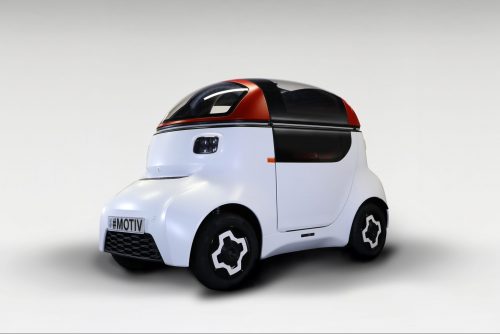Robotics firm forms key part of consortium ‘re-inventing the wheel’

A specially-designed wheel for electric vehicles has moved on to the next phase of testing.
ACRIM-Wheel is believed to be the world’s first commercially-viable, low cost, lightweight, all composite wheel for niche and electric vehicle applications.
It is being developed by a consortium including a Merseyside robotics business.
CNC Robotics has been working alongside Carbon ThreeSixty, Far-UK, and Composite Integation on the wheel which, they claim, can reduce the weight of, for example, a 15” wheel by 50%, which would deliver five per cent fuel savings or a five per cent CO2 reduction when retrofitted to a petrol or diesel fuelled vehicle.
Testing has now moved to the next phase of development, with the manufacture of 50 wheels by the end of the year.
Additionally, three full vehicle sets are destined for proving on MOTIV, a unique and versatile autonomous mobility vehicle, while two sets of world-first overmoulded RTM wheels are headed for qualification testing.
The consortium delivering the wheel, alongside Bitrez as the preferred resin formulator, have completed the second phase of the programme – development and validation of proof-of-concept ACRIM wheels – which confirmed the feasibility of achieving significant cost reductions over existing global market offerings.
The work being undertaken will enable wider access to key lightweighting technologies for the lower volume niche automotive manufacturers.
The product development consortium previously made a number of key findings, with a highlight being that the modular concept of ACRIM offers unrivalled flexibility in the styling and configuration of lightweight all-composite wheels.
For the next phase, which started this Summer, the consortium aims to decrease manufacturing cost and cycle time with a multi-strand approach.
The production scale-up project also aims to prove that robotic machining can be sufficiently accurate and repeatable for secondary machining and final trimming, with fast and flexible operation that opens the door to reduced skilled labour content.
Lead project partner, Edward Allnutt, managing director at Carbon ThreeSixty which specialises in the design and manufacture of advanced composite structures, said: “The world’s first all-composite wheel for electric and niche vehicles has moved a major step forward, and we can confidently say it has the ability to deliver huge cost savings over anything on the market.
“It can also be manufactured in volume and gives OEMs (original equipment manufacturers) huge flexibility in what they can specify.
“This is truly a quantum leap in wheel design and manufacture.”
Dr Kevin Lindsey, Far-UK director, said: “Far-UK is pleased to see this project progressing. We are convinced that the skills of the consortium will help the project progress to a fully carbon fibre wheel that customers want to use for the weight saving and that makes good economic sense to use as well.”
Philippa Glover, managing director of CNC Robotics, based in Bootle, North Merseyside, said: “The ACRIM II project is a great opportunity to demonstrate the benefits of using robots for secondary operations, including trimming and drilling, of composite components.
“Robots can offer a more cost-effective alternative to conventional machine tools in these applications and so can contribute to lower overall manufacturing costs for these types of part.”
The world’s first commercially viable, low cost, lightweight, all-composite wheel for electric and niche vehicles such as driverless cars, last mile delivery vehicles, road sweepers and next generation of agricultural vehicles, could now soon be a reality.
Previously seen to be purely performance driven for racing and high-performance applications, lightweight carbon wheels are now being investigated by electric and niche vehicles and OEMs to further reduce fuel consumption, emissions, extend vehicle range and increase payload.








